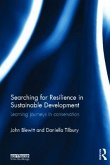While our world is characterized by mobility, global interactions, and increasing knowledge, we are facing serious challenges regarding the knowledge of the places around us. We understand and navigate our surroundings by relying on advanced technologies. Yet, a truly knowledgeable relationship to the places where we live and visit is lacking.
Hinweis: Dieser Artikel kann nur an eine deutsche Lieferadresse ausgeliefert werden.
Hinweis: Dieser Artikel kann nur an eine deutsche Lieferadresse ausgeliefert werden.
"While it is deeply rooted in Continental thought, this important work takes this enterprise in many new and sometimes illuminatingly surprising directions. We live in a curious time in which we imagine that we are at home everywhere in an increasingly homogenous world, but we cannot see that this is precisely the mark of our alienation: although we are all over the place (and place is increasing the same place everywhere), we have no real sense of place. Kuperus's wake-up call allows us to see Nietzsche's refusal of the homogenous herd and his call to be true to the earth as having made the "turn to place." The book also builds powerful new bridges into classical Zen thought (especially D gen Zenji) and indigenous Tlingit thought." -Jason Wirth, Seattle University, USA
"Place remains one of the most central and compelling themes in environmental philosophy, and Gerard Kuperus's Ecopolitical Homelessness makes one of the most noteworthy contributions to this central concern in recent years. Kuperus insightfully diagnoses the unique form of homelessness that afflicts much of the industrialized global north and, increasingly, the world-a form of homelessness obscured precisely by the degree to which globalization and homogenization give us the superficial sense of being at home everywhere, while simultaneously alienating us from the particular local realities that make up genuine places. Calling for a radical transition in our thinking and acting, Kuperus outlines a persuasive new ecopolitics of belonging, which incorporates both implacement and nomadism. In so doing, he points toward the way in which we can be responsible inhabitants of a planet faced with diverse environmental, social, and political challenges." -Brian Treanor, Loyola Marymount University, USA
"Kuperus provides a fresh approach to what at times is in danger of becoming a worn topic. We all can benefit from the exceptionally clear expositions of Nietzsche, Heidegger, Deleuze and Guattari that convincingly connect their ideas to environmental problems. More than that, the sure use of Latour to reassess the relationships between nature and politics is extended beyond Euro-centric positions by the interesting attention to D gen and Tlingit peoples."-Robert Mugerauer, University of Washington, USA
"The Water, Energy and Food Security Nexus unpacks the three critical components of development in India given concerns about climate change and sustainable resource management." - Elise Harrington, Massachusetts Institute of Technology
"The development of the book progressively sheds light on the contemporary absence of home by opening the space for a deep re ection. It invites us to interact in a di erent way with the places that we come across, by questioning anthropocentrism and looking for a political unity with other beings."
- Francesco Carpanini, Green Letters 23:2
"Place remains one of the most central and compelling themes in environmental philosophy, and Gerard Kuperus's Ecopolitical Homelessness makes one of the most noteworthy contributions to this central concern in recent years. Kuperus insightfully diagnoses the unique form of homelessness that afflicts much of the industrialized global north and, increasingly, the world-a form of homelessness obscured precisely by the degree to which globalization and homogenization give us the superficial sense of being at home everywhere, while simultaneously alienating us from the particular local realities that make up genuine places. Calling for a radical transition in our thinking and acting, Kuperus outlines a persuasive new ecopolitics of belonging, which incorporates both implacement and nomadism. In so doing, he points toward the way in which we can be responsible inhabitants of a planet faced with diverse environmental, social, and political challenges." -Brian Treanor, Loyola Marymount University, USA
"Kuperus provides a fresh approach to what at times is in danger of becoming a worn topic. We all can benefit from the exceptionally clear expositions of Nietzsche, Heidegger, Deleuze and Guattari that convincingly connect their ideas to environmental problems. More than that, the sure use of Latour to reassess the relationships between nature and politics is extended beyond Euro-centric positions by the interesting attention to D gen and Tlingit peoples."-Robert Mugerauer, University of Washington, USA
"The Water, Energy and Food Security Nexus unpacks the three critical components of development in India given concerns about climate change and sustainable resource management." - Elise Harrington, Massachusetts Institute of Technology
"The development of the book progressively sheds light on the contemporary absence of home by opening the space for a deep re ection. It invites us to interact in a di erent way with the places that we come across, by questioning anthropocentrism and looking for a political unity with other beings."
- Francesco Carpanini, Green Letters 23:2








